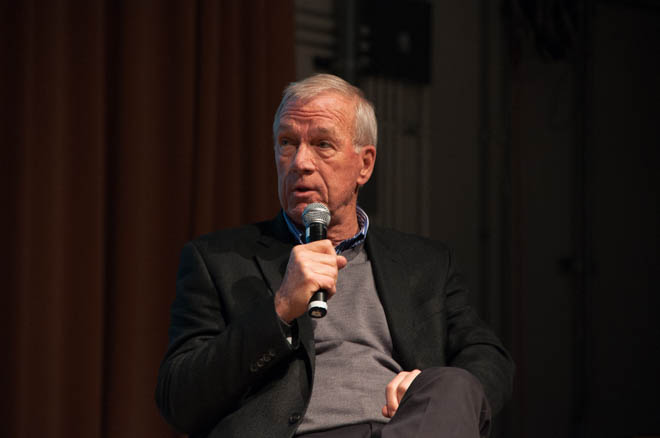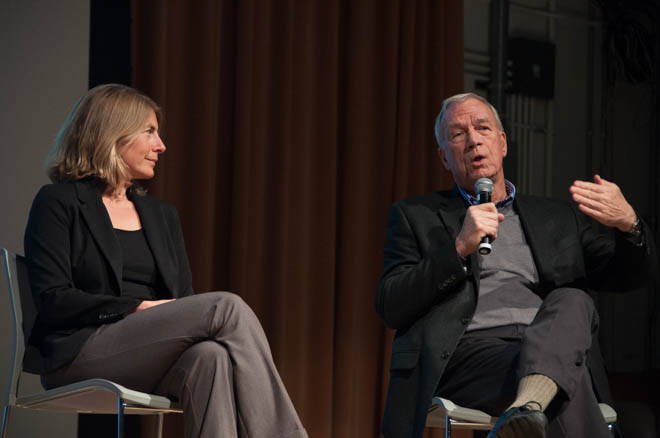They may be the subjects of Spotlight, the 2016 Best Picture Academy Award winner, but journalists Sacha Pfeiffer and Walter Robinson consider themselves anything but Hollywood royalty.
When asked about their Oscars experience, Pfeiffer and Robinson both stifled a laugh onstage Tuesday night in Ryan Auditorium. They recounted their trek up five balconies in Los Angeles' Dolby Theater to get to what they called “the worst seats in the house.”
Though the two were quick to crack jokes at their complete outsider-ness to the Hollywood world, they also took the opportunity to discuss the importance of their work in a Q&A moderated by Medill Professor Mei-Ling Hopgood. Their conversation, which included questions submitted by students, followed a screening of the award-winning film. Both portions were sponsored by A&O Productions and Studio 22.
For the uninitiated, Spotlight recounts the Boston Globe’s coverage of sexual abuse in the Roman Catholic Church and the investigative team, called – wait for it – Spotlight, that broke the news. Pfeiffer and Robinson were two journalists on that team.
What started out as an investigation of one priest in 2001 quickly grew to a 600-story report published over a one-year span documenting the Church’s systemic sexual abuse cover-up (think: the equivalent of 600 extremely intense research papers in a year).
But the movie turned the tables: Usually the ones with all the questions, Pfeiffer and Robinson told the nearly-packed auditorium how they were suddenly the subject of intense scrutiny during the movie’s creative process. The film’s director, Tom McCarthy, and screenwriter, Josh Singer, spent countless hours interviewing the team to research the story, even picking up on mannerisms and outfit choices of the journalists.
Pfeiffer and Robinson also discussed the global attention the film garnered for their reporting, which had previously been limited to only “the front page” of a Boston newspaper and met with much skepticism from a heavily Catholic readership.
“This movie has really reminded us about the power of Hollywood,” Pfeiffer said. “Keep in mind that we did this project a decade ago. It went online, which was novel for the time, but all of the sudden, this movie is meaning that people all over the world are learning about it as well.”
Pfeiffer, who remains on staff at the Globe, joked that the team always knows where the movie is playing, because their email inboxes are suddenly flooded with messages from the country in question.
When asked about the film’s accuracy, Robinson said that the dramatic license to embellish the true story slightly with different settings for conversations or composite characters (individual characters in the movie who represented more than one person in real life) felt very appropriate.
“There’s nothing at all exciting about investigative journalism,” Robinson said. He continued, explaining that the end result might be exciting to read, but the process itself is largely research-based.
“A two-hour movie of people making phone calls was not going to be very cinematic,” Pfeiffer added.
Most of all, both reporters emphasized the importance of giving voice to the voiceless through journalism. Though the team was largely comprised of Catholic reporters, there was an allegiance to the truth that Robinson and Pfeiffer said they held as their primary motivation in reporting on the faults of what's perceived to be an infallible institution.
“The institutions that we value most in our society, we do them no favors when we do not hold them as accountable as the political institutions that we do hold,” Robinson said.



